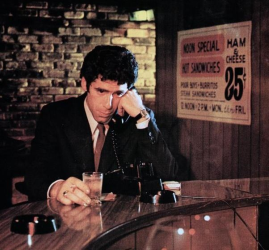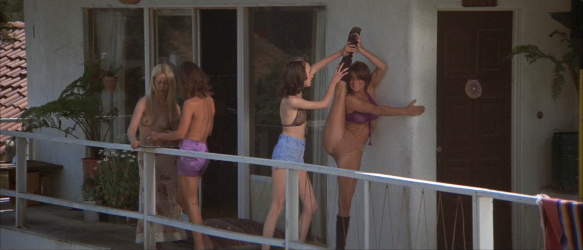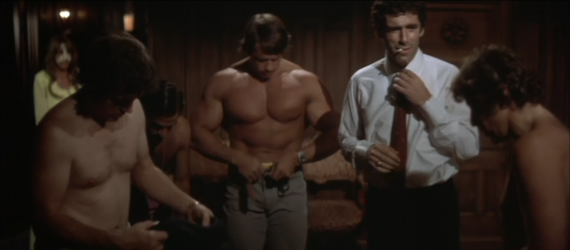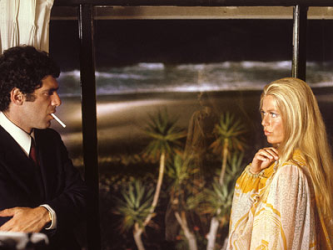Of the November detective movies, I was the coolest on this Robert Altman film, The Long Goodbye. I tend to be about 50-50 on Altman, finding him either brilliant or boring depending on the movie (or my mood). And 1973 isn’t exactly in my favorite time period. And rather than Humphrey Bogart playing Marlowe we have…Elliot Gould. Yeah, I was pretty cool on it, but the kids were into it so off we went.

That 25 cent ham & cheese looks good, tho’.
It’s really good. It’s got the ’70s sleaze, of course, because, of course, it’s the ’70s, and Hollywood was visibly sleazy then. (It’s still sleazy but up until recently, they had hid it better.) Gould’s Marlowe manages to be a man of his time but sort of reluctantly so, as he maintains a platonic but friendly relationship with his neighbors (a bevy of hippie girls who eschew clothing and do “yoga”, whatever that is), a bemused but friendly relationship with assorted dim-witted gangster types, and a less friendly relationship with local police.

Look at the pretty disease vectors.
The story is that, one morning, at around 2AM after going out to get food for his cat (Morris! in one of his many great roles from the era), an old pal needs to flee to Mexico. Seems he’s had a fight with his wife and he wants to be out of town until she cools off. Turns out the next morning, though, that she is dead—murdered!—with him as the number one suspect.
While Marlowe defends him to the police, he gets rousted and kept in jail for a few days. He’s finally released when the old pal turns up dead by suicide, which is a virtual admission of guilt, right?
Meanwhile, he’s approached by the wife of a man who knew his old pal and saw his picture in the paper. She wants him to find her wayward husband, whom she suspects is at the local sanitarium. She figures he’s trustworthy and can get to the bottom of things, which he does, after wrestling with Henry Gibson’s evil Dr. Verringer. (Metaphorically speaking. They don’t actually wrestle.) But something don’t quite add up, and the connection between his old pal and his new client becomes increasingly…connected, leading to a typically noir-y conclusion.

And now, to make up for the hippie girls, guys getting naked. Yes, that’s Arnold.
Gould does good. He doesn’t have the ’40s toughness but he’s not a complete clown. He mutters in a way that’s very funny and highly reminiscent of Altman’s 1980 flick Popeye, except that it made me laugh here. Nina van Pallandt is the damsel-in-distress, and she really made me think “Wow, Altman has a type” because she felt so evocative of Greta Scacchi (The Player). Even though Scachhi is Italian and Pallandt Danish, Scachhi was playing an Icelandic girl and there’s just a similar feel to them.
Sterling Hayden (Dr. Strangelove) does a good job as the unstable, alcoholic writer. Dan Blocker was the original actor Altman wanted, but he died before production and the movie is dedicated to him. Altman was allegedly resistant to Sterling Hayden doing the part but was eventually won over.
The whole movie has the typically Chandler-esque murkiness where it’s unclear why this happened or who did what to whom. Like, I feel like Verringer has a bigger and largely un-exposited hand in the ultimate fate of Sterling’s character. Leigh Brackett (The Empire Strikes Back) wrote the screenplay, however, and (as always with Chandler) you end up not really caring about plot details.

Even some of the blocking reminds me of “The Player”.
The movie opens and closes with a tinny, scratchy rendition of “Hooray for Hollywood” which is a little out of place. There’s nothing really Hollywood about the story, except for the location (Marlowe and Hippie Girls live in the Hollywood Hills). All the other music, however, is the song “The Long Goodbye”, written by John Williams (with lyrics by Johhny Mercer, who also wrote the lyrics for “Hooray for Hollywood”), all ambient and done in a variety of styles.
It’s a cute gag: It plays on the car radio through the credits. When Marlowe goes into the supermarket, it’s done in Muzak-style. There’s also an elevator version, a version done in a “soul” version, a jazz version, a version played by a mariachi band at a funeral, etc. etc. It’s cute.
It does give you a sense of the film, though: Altman eschews a lot of traditional film devices, like dramatic music at tense times. He does a lot of ambient conversation stuff that has an improvisational feel (and sometimes is improvisation). He used to say that actors thought he was brilliant because whenever they’d ask him about what a character should do or say, he’d respond with “Well, what do you think?” Anyway, you want to know that going in, which you probably do if you’ve ever seen an Altman film.
The kids all enjoyed it, though, and it won me over.

Marlowe at the “Burbank Sanitarium”. Were “sanitariums” still a thing by 1973?
